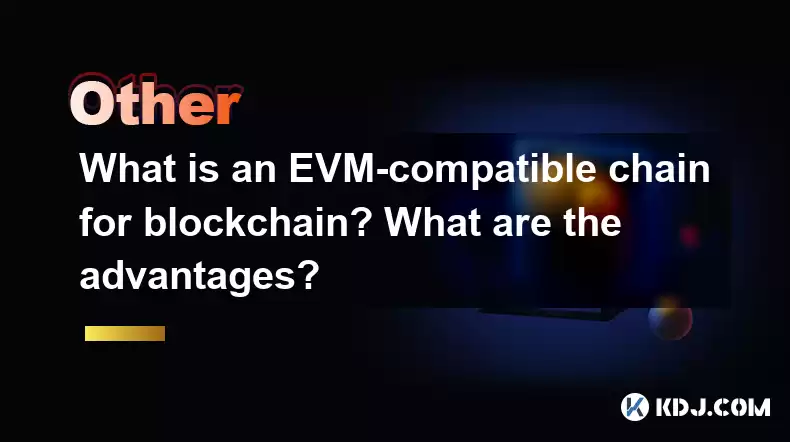-
 bitcoin
bitcoin $99296.318777 USD
-2.82% -
 ethereum
ethereum $3203.465899 USD
-6.84% -
 tether
tether $0.999590 USD
-0.03% -
 xrp
xrp $2.308913 USD
-4.00% -
 bnb
bnb $922.788929 USD
-3.53% -
 solana
solana $144.020807 USD
-5.89% -
 usd-coin
usd-coin $0.999798 USD
0.00% -
 tron
tron $0.291590 USD
-1.12% -
 dogecoin
dogecoin $0.163780 USD
-4.46% -
 cardano
cardano $0.526919 USD
-4.40% -
 hyperliquid
hyperliquid $37.888865 USD
-2.24% -
 bitcoin-cash
bitcoin-cash $510.515457 USD
-1.08% -
 chainlink
chainlink $14.436987 USD
-5.63% -
 stellar
stellar $0.267345 USD
-4.77% -
 unus-sed-leo
unus-sed-leo $9.175222 USD
0.53%
What is an EVM-compatible chain for blockchain? What are the advantages?
EVM-compatible chains support Ethereum's smart contracts, enhancing interoperability and allowing developers to leverage Ethereum's ecosystem with ease.
Apr 30, 2025 at 01:57 am

An EVM-compatible chain refers to a blockchain that supports the Ethereum Virtual Machine (EVM). The EVM is a crucial component of the Ethereum network, allowing smart contracts to be executed in a decentralized manner. By being EVM-compatible, other blockchains can run Ethereum's smart contracts and decentralized applications (dApps) natively, thereby expanding their functionality and interoperability with the Ethereum ecosystem.
What is the Ethereum Virtual Machine (EVM)?
The Ethereum Virtual Machine (EVM) is a runtime environment for smart contracts in Ethereum. It is a stack-based, 256-bit register virtual machine that executes bytecode, which is the compiled version of smart contracts written in high-level languages like Solidity. The EVM ensures that all nodes in the Ethereum network run the same code, maintaining the integrity and consistency of the blockchain.
How Does an EVM-Compatible Chain Work?
An EVM-compatible chain operates by integrating the EVM into its architecture. This means that the chain can execute Ethereum bytecode and support Ethereum-based smart contracts and dApps. To achieve this, the blockchain must implement the EVM's core functionalities, including gas mechanics, state transitions, and the ability to process transactions and execute contracts in a manner consistent with Ethereum's specifications.
Advantages of EVM-Compatible Chains
There are several advantages to using an EVM-compatible chain:
Interoperability: EVM-compatible chains can seamlessly interact with the Ethereum ecosystem, allowing for the easy transfer of assets and data between different blockchains. This enhances the overall interoperability of the blockchain space.
Developer Familiarity: Developers already familiar with Ethereum's smart contract language, Solidity, can easily develop on EVM-compatible chains without needing to learn new programming languages or frameworks. This lowers the barrier to entry and accelerates the development of new projects.
Access to Ethereum's Ecosystem: By being EVM-compatible, these chains gain access to Ethereum's vast ecosystem of tools, libraries, and dApps. This includes popular platforms like Uniswap, Aave, and Compound, which can be deployed on EVM-compatible chains with minimal modifications.
Scalability Solutions: Some EVM-compatible chains focus on providing scalability solutions that Ethereum struggles with, such as faster transaction processing and lower fees. This can make them attractive alternatives for users and developers looking to overcome Ethereum's limitations.
Community and Network Effects: Being part of the Ethereum ecosystem allows EVM-compatible chains to benefit from Ethereum's large and active community, as well as its established network effects. This can drive adoption and increase the value of the chain.
Examples of EVM-Compatible Chains
Several blockchains have implemented EVM compatibility, each with its unique features and focus areas. Some notable examples include:
Binance Smart Chain (BSC): Known for its low transaction fees and fast processing times, BSC has become a popular platform for DeFi and NFT projects. It uses a consensus mechanism called Proof of Staked Authority (PoSA), which combines elements of Proof of Stake (PoS) and Proof of Authority (PoA).
Polygon (formerly Matic Network): Polygon is designed to provide scalability solutions for Ethereum, offering sidechains and other layer-2 scaling options. It supports EVM compatibility, allowing developers to deploy Ethereum dApps on its network with ease.
Avalanche: Avalanche is a high-performance blockchain that supports EVM compatibility through its C-Chain. It is known for its sub-second finality and high throughput, making it suitable for a wide range of applications.
Fantom: Fantom is another high-performance blockchain that uses a directed acyclic graph (DAG) for consensus. It is EVM-compatible and focuses on providing fast and secure transactions at a low cost.
How to Deploy a Smart Contract on an EVM-Compatible Chain
Deploying a smart contract on an EVM-compatible chain involves several steps. Here's a detailed guide on how to do it using Binance Smart Chain as an example:
Set Up Your Development Environment: First, ensure you have Node.js and npm installed on your system. Then, install the necessary tools like Truffle and the BSC testnet provider.
- Install Truffle:
npm install -g truffle - Install BSC testnet provider:
npm install @truffle/hdwallet-provider
- Install Truffle:
Create a New Truffle Project: Use Truffle to create a new project directory and navigate to it.
truffle initcd your-project-directory
Write Your Smart Contract: Create a new file in the
contractsdirectory and write your smart contract in Solidity.touch contracts/MyContract.sol
Configure Truffle: Edit the
truffle-config.jsfile to include the BSC testnet settings. You'll need your private key and the BSC testnet RPC URL.const HDWalletProvider = require('@truffle/hdwallet-provider');const privateKey = 'YOUR_PRIVATE_KEY';module.exports = { networks: {
bscTestnet: { provider: () => new HDWalletProvider(privateKey, 'https://data-seed-prebsc-1-s1.binance.org:8545'), network_id: 97, confirmations: 10, timeoutBlocks: 200, skipDryRun: true },}, compilers: {
solc: { version: '0.8.0', },},};
Compile Your Contract: Use Truffle to compile your smart contract.
truffle compile
Deploy Your Contract: Deploy your contract to the BSC testnet using Truffle.
truffle migrate --network bscTestnet
Interact with Your Contract: Once deployed, you can interact with your contract using Truffle's console or a web3 library.
truffle console --network bscTestnetlet instance = await MyContract.deployed()let result = await instance.someFunction()
Security Considerations for EVM-Compatible Chains
When working with EVM-compatible chains, it's important to consider security aspects to protect your assets and ensure the integrity of your smart contracts. Some key security considerations include:
Smart Contract Audits: Before deploying a smart contract, it's advisable to have it audited by a reputable security firm. Audits can help identify vulnerabilities and ensure that the contract behaves as intended.
Reentrancy Attacks: One of the most common vulnerabilities in smart contracts is reentrancy. Ensure that your contract follows best practices to prevent such attacks, such as using the 'checks-effects-interactions' pattern.
Gas Optimization: Efficient gas usage is crucial to prevent out-of-gas errors and reduce transaction costs. Optimize your contract's code to minimize gas consumption.
Access Control: Implement proper access control mechanisms to ensure that only authorized users can execute certain functions. This can be achieved using modifiers and role-based access control.
Oracles and External Data: If your contract relies on external data, ensure that you use trusted oracles and implement proper validation mechanisms to prevent manipulation.
Frequently Asked Questions
Q: Can I use the same wallet for different EVM-compatible chains?A: Yes, you can use the same wallet for different EVM-compatible chains, provided the wallet supports those chains. Wallets like MetaMask allow you to switch between different EVM-compatible networks easily.
Q: Are all smart contracts written for Ethereum automatically compatible with EVM-compatible chains?A: While most smart contracts written for Ethereum can be deployed on EVM-compatible chains with minimal modifications, there might be some differences in behavior due to chain-specific features or limitations. It's always a good practice to test your contract on the target chain before deployment.
Q: How do I choose the right EVM-compatible chain for my project?A: Choosing the right EVM-compatible chain depends on your project's specific needs. Consider factors such as transaction fees, speed, scalability, security, and the ecosystem's maturity. Research each chain's features and community to determine which one aligns best with your goals.
Q: Can EVM-compatible chains interact with non-EVM chains?A: Yes, through the use of cross-chain bridges and interoperability protocols, EVM-compatible chains can interact with non-EVM chains. These solutions allow for the transfer of assets and data between different blockchain ecosystems.
Disclaimer:info@kdj.com
The information provided is not trading advice. kdj.com does not assume any responsibility for any investments made based on the information provided in this article. Cryptocurrencies are highly volatile and it is highly recommended that you invest with caution after thorough research!
If you believe that the content used on this website infringes your copyright, please contact us immediately (info@kdj.com) and we will delete it promptly.
- Crypto Carnage: Navigating Selling and Liquidations in a Wild Market
- 2025-11-14 16:50:01
- Mohammed Siraj's First Spell Woes: An India Teammate's Critique
- 2025-11-14 14:40:02
- BTC, ETH, and Altcoin Picks: Navigating the Crypto Landscape
- 2025-11-14 14:50:01
- Coin Toss Tales: Temba Bavuma's Wager and India vs. SA Showdown
- 2025-11-14 12:50:01
- Shubman Gill, WTC Final, and the Coin Toss: A New Yorker's Take
- 2025-11-14 15:05:01
- Aerodrome Takes Flight: Unifying Ethereum DeFi Liquidity Across Chains
- 2025-11-14 15:10:02
Related knowledge

What is the difference between a blockchain and a distributed ledger technology (DLT)?
Nov 14,2025 at 08:59pm
Understanding the Core Structure of Blockchain and DLT1. A blockchain is a specific type of distributed ledger technology that organizes data into blo...

How does a blockchain handle data storage?
Nov 14,2025 at 04:40pm
Understanding Blockchain Data Structure1. A blockchain stores data in sequential blocks, each containing a list of transactions or records. These bloc...

What are the risks of investing in blockchain projects?
Nov 14,2025 at 10:19am
Risks Associated with Volatility in Cryptocurrency Markets1. The price of digital assets can shift dramatically within minutes due to speculation, new...

What is the role of blockchain in creating a circular economy?
Nov 15,2025 at 02:19am
Enhancing Transparency in Supply Chains1. Blockchain technology provides an immutable ledger that records every transaction across supply chains, ensu...

How can blockchain technology be used in healthcare?
Nov 14,2025 at 07:39pm
Secure Patient Data Management1. Blockchain enables decentralized storage of medical records, ensuring patients maintain control over who accesses the...

How does blockchain impact the future of voting systems?
Nov 14,2025 at 10:00pm
Enhanced Security in Digital Voting Through Blockchain1. Blockchain technology introduces cryptographic hashing that ensures each vote is immutable on...

What is the difference between a blockchain and a distributed ledger technology (DLT)?
Nov 14,2025 at 08:59pm
Understanding the Core Structure of Blockchain and DLT1. A blockchain is a specific type of distributed ledger technology that organizes data into blo...

How does a blockchain handle data storage?
Nov 14,2025 at 04:40pm
Understanding Blockchain Data Structure1. A blockchain stores data in sequential blocks, each containing a list of transactions or records. These bloc...

What are the risks of investing in blockchain projects?
Nov 14,2025 at 10:19am
Risks Associated with Volatility in Cryptocurrency Markets1. The price of digital assets can shift dramatically within minutes due to speculation, new...

What is the role of blockchain in creating a circular economy?
Nov 15,2025 at 02:19am
Enhancing Transparency in Supply Chains1. Blockchain technology provides an immutable ledger that records every transaction across supply chains, ensu...

How can blockchain technology be used in healthcare?
Nov 14,2025 at 07:39pm
Secure Patient Data Management1. Blockchain enables decentralized storage of medical records, ensuring patients maintain control over who accesses the...

How does blockchain impact the future of voting systems?
Nov 14,2025 at 10:00pm
Enhanced Security in Digital Voting Through Blockchain1. Blockchain technology introduces cryptographic hashing that ensures each vote is immutable on...
See all articles










































































